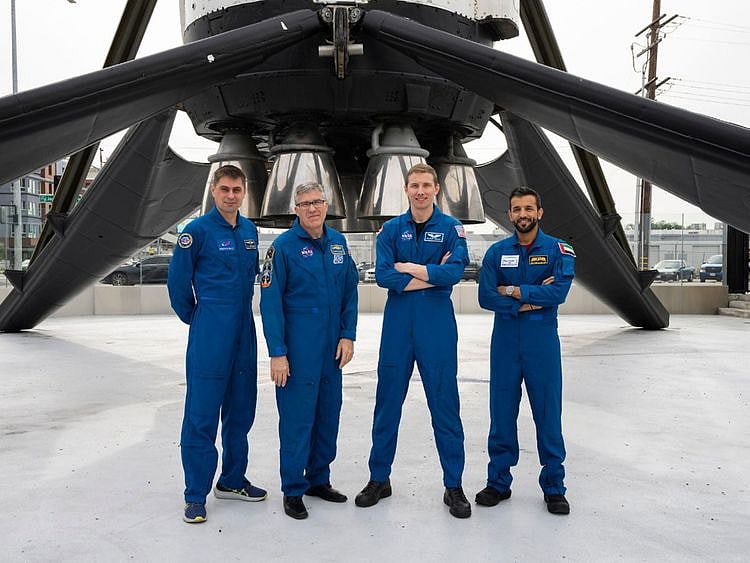UAE: First Arab long-duration space mission on February 26
Sultan AlNeyadi headed to ISS, will spend Ramadan in space

Dubai: The launch date and time of the first Arab long-duration astronaut mission that will bring Sultan Al Neyadi to the International Space Station (ISS) is set on February 26 at 11.07am (UAE time), the Mohammed Bin Rashid Space Centre (MBRSC) has confirmed.
The SpaceX Dragon spacecraft, named Endeavour, atop a Falcon 9 rocket, that will carry Al Neyadi, along with two NASA astronauts – mission commander Stephen Bowen and Pilot Warren Hoburg – and Roscosmos cosmonaut Andrey Fedyaev to the ISS will be launched from Launch Complex 39A at NASA’s Kennedy Space Centre in Florida.
There will be three launch opportunities in a row that would satisfy the requirements to dock at the ISS, MBRSC noted.
During the NASA Crew-6 press conference on Wednesday night, AlNeyadi talked about the scientific experiments that he and other crew members will conduct onboard the microgravity laboratory. He said: “We will be conducting science experiments on fluidics (study of fluid behaviour under microgravity), alongside combustion experiments, and other scientific observations to see the impact of weightlessness on our bodies.”
UAE Astronaut Programme
In a separate media briefing MBRSC Director-general Salem Humaid AlMarri said: “We are proud to talk about our second mission under the UAE Astronaut Programme and Sultan’s first mission to space. Our human space programme kicked off in 2017 when we selected our first two astronauts, Hazzaa AlMansoori and Sultan AlNeyadi. We had our first mission to the ISS in 2019, which had an impact on hundreds of thousands of people.”
“Today Sultan AlNeyadi is a very capable astronaut and he, along with his colleague Hazzaa AlMansoori have a total of five years of training, including training on EVA (extravehicular activity) and operations aboard the ISS. We have over 20 science experiments from UAE universities in the upcoming mission and a lot of outreach activities being done across the region,” he added.
Second space mission
AlNeyadi, who will stay aboard the ISS for six months as mission specialist, also talked about the rapid development of the UAE Astronaut Programme, noting: “The trip to space by Hazzaa AlMansoori (in 2019) marked the UAE’s consistent presence in space. Our Prime Minister promised to continue these flights, and now we’re talking about the second mission to the International Space Station. This time we raised the bar to six months, and we now have two additional astronauts training with the class of ’23.”
Moving forward, he continued: “I would also love to see the UAE flag on the lunar surface, carried on the shoulder of a UAE astronaut. UAE is doing an excellent job, and I believe that in the next 10 years, we will be following international efforts to go to space and push the boundaries of exploration.”
Describing his excitement for the upcoming space mission, Al Neyadi said: “The idea of waking up every morning and having access to a window like the Cupola, where one can scan the entire world in 90 minutes, is amazing, and I believe it is literally out of this world.”
“(But) the most difficult thing is staying away from family during the mission, and hopefully we will keep the bond with our family,” he added.
Iftar in space
Answering a question from Gulf News on how he will spend Ramadan in space, AlNeyadi explained: “The six-month space mission is a great privilege and responsibility. Throughout the period we will be passing through Ramadan and Eid. Like a definition of traveller, I can actually break fasting. You are allowed to eat sufficient food and prevent anything that can jeopardise the mission or put the crew at risk due to lack of food and hydration,” he added.
Looking at his crew members, Al Neyadi continued: “Fasting is actually healthy and Ramadan is a good occasion that I will be sharing (Iftar) meals with you guys.”
This will be the first spaceflight for AlNeyadi, Hoburg and Fedyaev; and the fourth mission to space for Bowen.
The upcoming mission will make the UAE only the eleventh country in the world to send its astronauts on a long-term mission to space.
Sign up for the Daily Briefing
Get the latest news and updates straight to your inbox
Network Links
GN StoreDownload our app
© Al Nisr Publishing LLC 2026. All rights reserved.